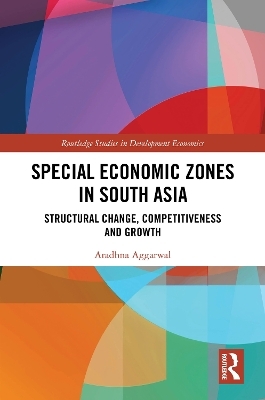
Special Economic Zones in South Asia
Routledge (Verlag)
978-1-032-58775-2 (ISBN)
Growth‑enhancing structural change—a relocation of labour from low‑ to high‑productivity sectors—is increasingly perceived as inextricably linked with the sustainable development agenda. In the pursuit of structural change, policymakers have pinned their hopes on targeted policy tools such as special economic zones (SEZs). These geographically demarcated spaces designed to attract investment with a wide set of advantages have become de rigueur; however, a systematic evaluation of evidence‑informed policymaking is scarce due to conceptual and practical challenges. This book fills that gap and shows that SEZs are no ‘shortcut’ to economic development; their success in driving economic transformation depends on the complex interplay of sociopolitical, economic and strategic factors.
This book contributes to the burgeoning literature on SEZs by providing the first systematic evaluation of the SEZ policy. It adopts the ‘policy cycle approach’ to organise policy evaluation into three hierarchical layers: input evaluation (agenda building), output evaluation (policy designs) and outcome evaluation (immediate effects of SEZs on firms’ behaviour and performance) with special reference to South Asian countries. The strategy is to bring together the findings of microeconomic evaluations to draw macro inferences on the contribution of SEZs to the broader objectives of structural transformation and competitiveness. Part I of the book delves into development challenges facing the region, lays out theoretical foundations underlying the relevance of SEZs in addressing them and examines the relevance of SEZs in the context of South Asia. Part II evaluates the policy first at systemic level to gauge whether and how the policy is rooted in broader development goals and then at the design level to examine the fit between the policy goals and designs. Part III presents a counterfactual evaluation of the impact of SEZs on investment climate; export competitiveness of firms; technology and innovation; and knowledge linkages of SEZ firms with the wider economy. The final chapter concludes by discussing the emerging challenges and the way forward.
This will be a useful reference for academics, researchers, policymakers and professionals in international trade and business, public policy, industrial economics and regional integration.
Aradhna Aggarwal is a Full Professor of Economics in the Department of International Economics, Government and Business, Copenhagen Business School, Copenhagen, Denmark.
1. 1. Introduction Part I Input Assessment 2. Economic Growth Accelerations in South Asia 3. Growth Acceleration and Patterns and Pace of Structural Change 4. International Competitiveness: Export Growth, Diversification and Upgrading 5. SEZs As a Development Policy: Revisiting the Place Based Approach 6. Economic Rationale of SEZs in South Asia: The Institutional Perspective Part Ii Outcome Assessment 7. The SEZ Policy in India: A Flip Flop Approach 8. Evolution Of SEZ Policy in Sri Lanka: An Interplay of Political and Economic Dynamics 9. SEZ Policy In Pakistan: A Passive Approach 10. Bangladesh: Driving SEZ Centric Industrialisation 11. Assessing The SEZ Policy Design Fit with Its Evolutionary Dynamics Part Iii Outcome Evaluation 12. Evaluating The Impact of SEZs on Investment Climate 13. SEZs, Investment Climate and Competitiveness 14. Building Technological Capabilities Through SEZs 15. Linkages For Knowledge Spillovers 16. Sustainability Standards in SEZs: Is It Race to The Bottom? 17. The Concluding Remarks
| Erscheinungsdatum | 03.04.2024 |
|---|---|
| Reihe/Serie | Routledge Studies in Development Economics |
| Zusatzinfo | 48 Tables, black and white; 22 Line drawings, black and white; 22 Illustrations, black and white |
| Verlagsort | London |
| Sprache | englisch |
| Maße | 156 x 234 mm |
| Gewicht | 807 g |
| Themenwelt | Sozialwissenschaften ► Soziologie ► Spezielle Soziologien |
| Wirtschaft ► Volkswirtschaftslehre ► Makroökonomie | |
| ISBN-10 | 1-032-58775-X / 103258775X |
| ISBN-13 | 978-1-032-58775-2 / 9781032587752 |
| Zustand | Neuware |
| Informationen gemäß Produktsicherheitsverordnung (GPSR) | |
| Haben Sie eine Frage zum Produkt? |
aus dem Bereich


